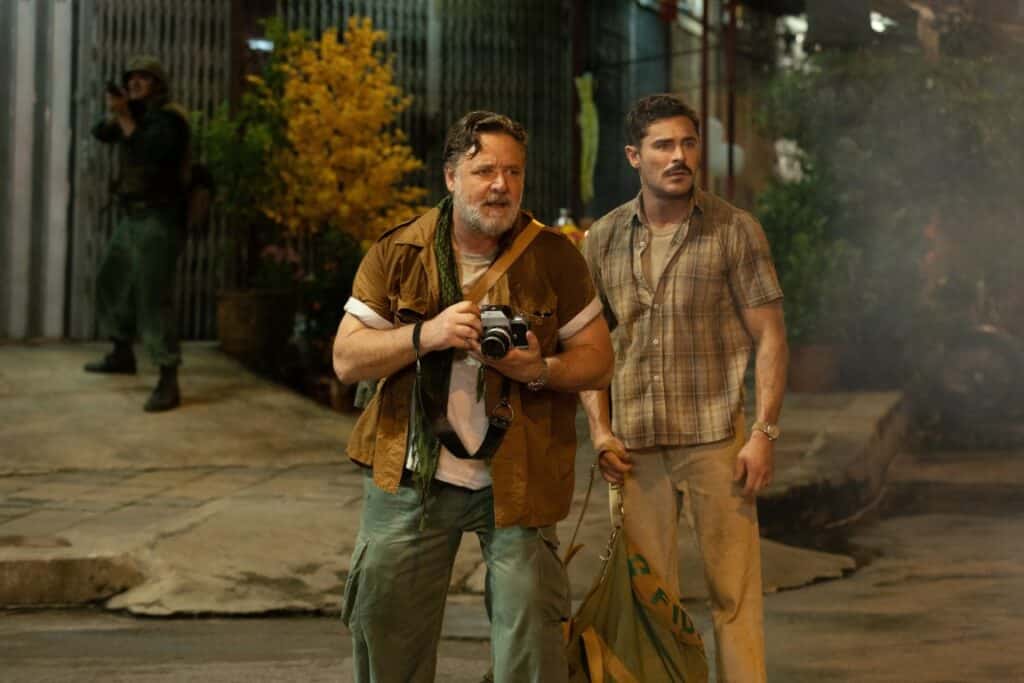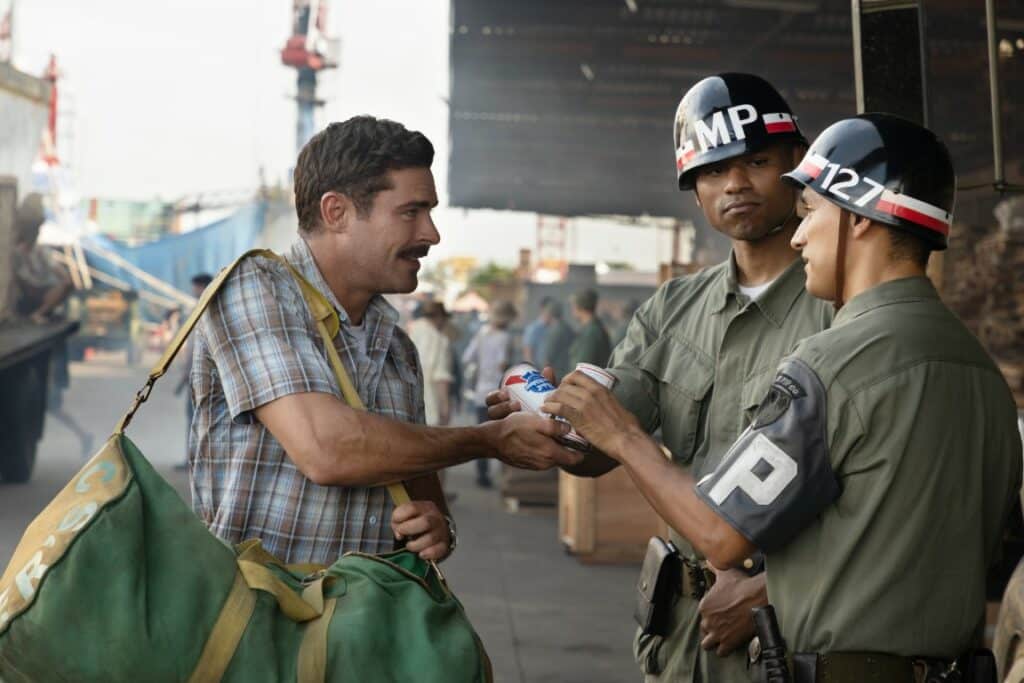Zac Efron and Russell Crowe star in a paltry brew of a Vietnam comedy that expects a big pat on the back for effort.
“What is Vietnam?” is not a question with an easy answer, but The Greatest Beer Run Ever tackles the challenge anyway. Like the plethora of media featuring the country—in any capacity—Peter Farrelly’s film runs headlong into the notion that what is an S-shaped piece of land in Southeast Asia can also be a dream after the Fall of Saigon. Or that the starry banner that international bodies recognize is not the triple-striped one flying overseas. Or that any example henceforth will possess the same gist: try to ring up nuance when discussing Vietnam.
Sadly, Beer Run doesn’t do that. Frankly, since the makers of Green Book are at the helm, it must have never felt the need to. As with that Oscar-winning feature, Farrelly seems to have deemed nuance the pooper of the party. In this case, the party constitutes the real-life (and previously adapted into a short film & book) U.S.-to-Vietnam journey of 26-year-old John “Chickie” Donohue (Zac Efron) to give morale-boosting Pabst Blue Ribbon cans to soldiering friends in 1967. And so, in displaying its understanding of Vietnam, the film collectively cycles through “Thailand,” “kumbaya,” “both-sides-ism” and “the motions.” Anything to keep the beer mobile and its delivery enjoyable first.
Thailand as a backdrop is the easiest thorn to tolerate in Beer Run. With the war, the maimed or dead, (digitized) bombings, and political brushes, the odds of the production having Vietnam’s participation is none and below. Thailand, and Thais, as a substitute is thus again the natural order; it’s either that or no film at all.
There is no Sài Gòn, Đà Nẵng, Kon Tum, or Long Bình here—only Bangkok, Hua Hin, Chiang Dao, and Ratchaburi, plus their respective city streets, country sights, and wilderness. Have Thai extras wear áo dài or don conical hats, and they become Vietnamese. Gather some actors of Viet descent and give them bit roles (like Hieu (Kevin Tran), the Oklahoma fan-slash-traffic cop) or even a bit silent role (à la the mother (Nguyen Thi Thanh Thao) who fearfully grabs her young daughter (Chananticha Chaipa) when the latter encounters Chickie some ways away from “Kon Tum”).

But the tolerance in Beer Run is notably not as substantial as other (war-ravaged) Vietnam titles due to two startling flaws. That prominent sign by the U.S. Embassy? There is a visible spelling error—“Hây” when it’s “Hãy”—and it seems to have been a digital creation in a time when people generally paint their signs. The landmark Hotel Caravelle where international war correspondents, one of them Arthur Coates (Russell Crowe, gravitas galore for nothing), are situated? It has been recreated here as not being on the block’s corner, with traffic outside its main doors flowing rightward instead of left.
For these slipups to pass muster, it is evident that production designer Tim Galvin and the film’s many producers—none are of Vietnamese descent; one (Andrew Muscato) is the director of the aforementioned short—have given more TLC to the beer than the places they pass it through.
Beer Run’s script, from Farrelly himself, Brian Hayes Currie, and Pete Jones, also holds this stance. There are no characters here—only writerly devices that move this way on cue and embrace that attitude on command. Rather than evolving Efron’s Chickie, they just place him on a new page, micromanaged by their pen rather than unearthing enough agency for him to work things out.
But, for argument’s sake, if we must consider our mustachioed protagonist in flesh-and-bone terms, then he’s just an archetype. Just the kind of guy who’s so infatuated with the idea of harmony he will agree with everyone (or, at worst, take a side in the moment and drop it once out of sight). It’s almost heartbreaking to see how Efron’s blue-eyed determination to wring out a complex, grown-up performance is dashed with every new scene (or even new cut).
Speaking of hope, don’t hold your breath for the direction to pick up the scripting slack either. Farrelly the writer is also at the controls, after all. The playbook is clearly to keep matters at funny, frothy levels; Farrelly will always underscore Chickie’s actions as endearing (with the occasional help of Hien (Thai Hoa Le), the bartender at Caravelle) or immediately neutralize any instance of unpleasantness.

Take the scene where a plane must offload its body bags before Chickie can board it to LZ Jane. Before we can get how that notion and corresponding visuals will upgrade his simplemindedness, the jovial strikes of Francis Lai’s “Saint-Tropez” floods the audio like a jump scare. The use of “Cherish” by The Association is supposed to provide an at-altitude interrogation of the war—featuring both ADR-ed and not easily decipherable Vietnamese—with a dramatic climax. Instead, its placement acts as a shortcut to the happy place. Accidental or not, insensitivity creeps into the frame.
Even when the music has cut out and the characters have to deliver Beer Run’s blunt messages, there isn’t much of a directorial improvement. Farelly seems to have given cinematographer Sean Porter just two choices here, both boring in practice: Cover all the gathering heads in one wide shot or ping-pong between speakers. It’s the visual version of the film’s tone-ruining deference to staying superficial.
Beer Run is a good reminder that Kendall Jenner’s Pepsi ad wasn’t just a one-off: Both share the strategy of putting the beverage before the thornier issues, armed with naïve belief that the final product means well. It’s not just a person who keeps on keeping on against adversity here, but an opportunity to be so much more. There may have never been any interest in inspecting these ideas; that would lock the beer in place and attach strings to its delivery.
Avoiding these thorny issues seems to be the strategy. since they would force the film to form a thoughtful, more profound answer to the question, “What is Vietnam?” It’s too much work, and something Farrelly doesn’t have the skillset, subtlety, and style to address. It’s the thing that will change what The Colonel (Bill Murray) sees on his TV. And it seems no one involved with the production wants him to kick them out of his cozy Inwood bar.
(Correction: A previous version of this article cited “Saint-Tropez” as a song by Post Malone; it actually refers to the song by Francis Lai. We have amended the article to reflect that correction.)
The Greatest Beer Run Ever is currently in theaters and streaming on Apple TV+.
The Greatest Beer Run Ever Trailer:
Read next: The Spool's Best New Releases
Streaming guides
The Best Live TV Streaming Services With Free Trial
The praises of live TV streaming services don’t need to be further sung. By now, we all know that compared to clunky, commitment-heavy cable, live TV is cheaper and much easier to manage. But just in case you’re still on the fence about jumping over to the other side, or if you’re just unhappy with ... The Best Live TV Streaming Services With Free Trial
How to Watch Power Book III: Raising Kanan Season 3
Season 3 of the hotly anticipated Power spin-off, Power Book III: Raising Kanan, is arriving on Starz soon, so you know what that means: it’s the ’90s again in The Southside, and we’re back with the Thomas family as they navigate the ins and outs of the criminal underworld they’re helping build. Mekai Curtis is ... How to Watch Power Book III: Raising Kanan Season 3
How to Watch Doctor Who: 60th Anniversary Specials
Ladies and gentlemen, we’re so back! To celebrate Doctor Who’s 60th anniversary, the BBC is producing a three-episode special starring none other than the Tenth/Fourteenth Doctor himself, David Tennant. And to the supreme delight of fans (that would be me, dear reader), the Doctor will be joined by old-time companion Donna Noble (Catherine Tate) and ... How to Watch Doctor Who: 60th Anniversary Specials
Which Netflix Country has Interstellar?
Maybe you’ve just seen Oppenheimer and have the strongest urge to marathon—or more fun yet, rank!—all of Christopher Nolan’s films. Or maybe you’re one of the few who haven’t seen Interstellar yet. If you are, then you should change that immediately; the dystopian epic is one of Nolan’s best, and with that incredible twist in ... Which Netflix Country has Interstellar?
Which Netflix Country Has Each Movie of The Hunger Games?
For whatever reason, The Hunger Games series isn’t available in the same countries around the world. You’ll find the first and second (aka the best) installments in Hong Kong, for instance, but not the third and fourth. It’s a frustrating dilemma, especially if you don’t even have a single entry in your region, which is ... Which Netflix Country Has Each Movie of The Hunger Games?
How to Watch ESPN With A Free Trial
One of the major concerns people have before cutting the cord is potentially losing access to live sports. But the great thing about live TV streaming services is that you never lose that access. Minus the contracts and complications of cable, these streaming services connect you to a host of live channels, including ESPN. So ... How to Watch ESPN With A Free Trial
How to Watch Paramount Network With a Free Trial
To date, Paramount Network has only two original shows on air right now: Yellowstone and Bar Rescue. The network seems to have its hands full with on-demand streaming service Paramount+, which is constantly stacked with a fresh supply of new shows. But Yellowstone and Bar Rescue are so sturdy and expansive that the network doesn’t ... How to Watch Paramount Network With a Free Trial
How to Watch WE TV With a Free Trial
Previously “Women’s Entertainment,” We TV has since rebranded to accurately reflect its name and be a more inclusive lifestyle channel. It’s home to addictive reality gems like Bold and Bougie, Bridezillas, Marriage Boot Camp, and The Untold Stories of Hip Hop. And when it’s not airing original titles, it has on syndicated shows like 9-1-1, ... How to Watch WE TV With a Free Trial
How to Watch Comedy Central With a Free Trial
It’s no coincidence that many of today’s biggest comedians found their footing on Comedy Central: the channel is a bastion of emerging comic talents. It served as a playground for people like Nathan Fielder (Fielder For You), Ilana Glazer and Abbi Jacobson (Broad City), Tim Robinson (Detroiters), and Dave Chappelle (Chappelle’s Show) before they shot ... How to Watch Comedy Central With a Free Trial
How to Watch FX With a Free Trial
You’d be hard-pressed to find a bad show airing on FX. The channel has made a name for itself as a bastion of high-brow TV, along with HBO and AMC. It’s produced shows like Atlanta, Fargo, The Americans, Archer, and more recently, Shogun. But because it’s owned by Disney, it still airs several blockbusters in ... How to Watch FX With a Free Trial
How to Watch TNT Sports With A Free Trial
For many sports fans, TNT is a non-negotiable. It broadcasts NBA, MLB, NHL, college basketball, and All Elite Wrestling matches. And, as a bonus, it also has reruns of shows like Supernatural, Charmed, and NCIS, as well as films like The Avengers, Dune, and Justice League. But while TNT used to be a cable staple, ... How to Watch TNT Sports With A Free Trial